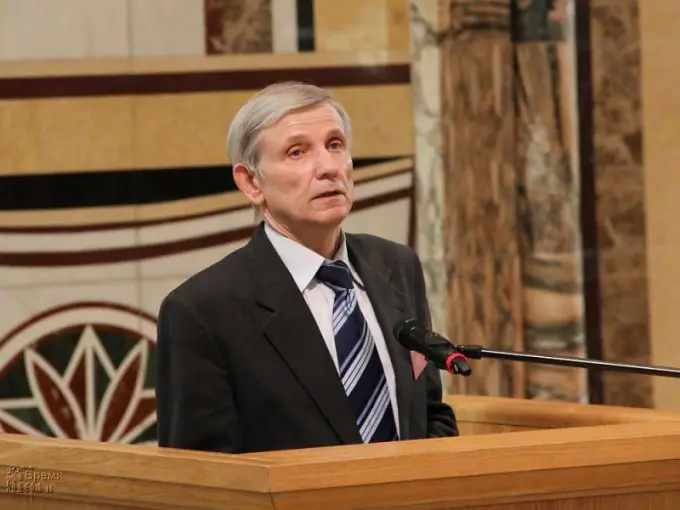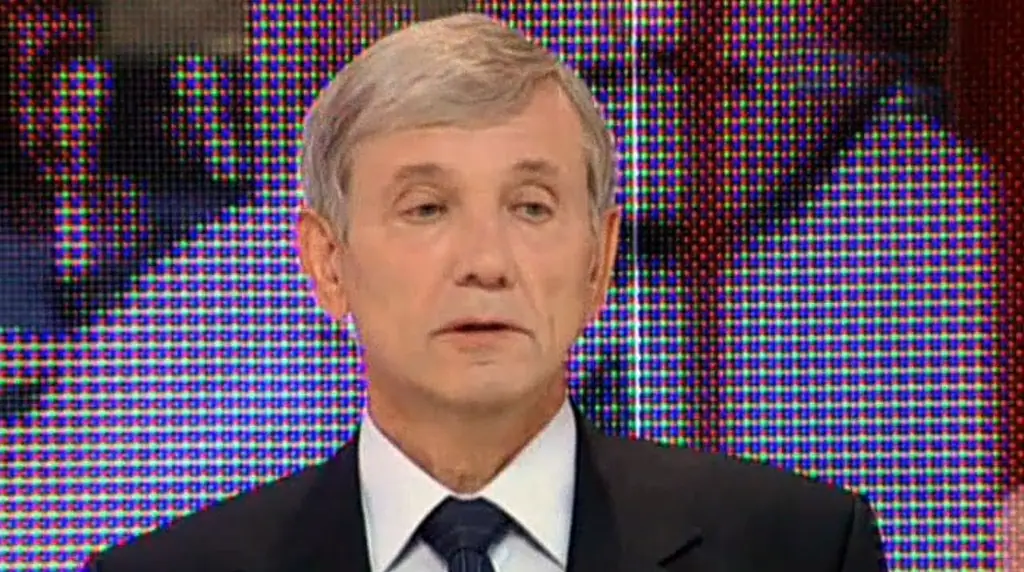- Author Antonio Harrison harrison@cultureoeuvre.com.
- Public 2023-12-16 07:44.
- Last modified 2025-01-22 21:44.
Nikolai Sergeevich Borisov did not immediately discover the talent of the historian. In his youth, before entering the Moscow State University. Lomonosov, he worked for some time as an ordinary locksmith. After graduating from the university, Nikolai Sergeevich became one of the outstanding Russian researchers specializing in the Old Russian period and the history of the church.

Today Nikolai Borisov is one of the most competent scholars on medieval Russia in the country. Since 2007, the researcher has been at the head of Moscow State University. Lomonosov Department of the History of Russia until the 19th century.
Biography
Nikolay Borisov was born on July 29, 1952 in Essentuki. The scientist's mother worked all her life as an engineer on the railway, and his father was a journalist for the local newspaper "Gudok".
There is practically no public information about the researcher's childhood and student years in the public domain. According to the recollections of friends and acquaintances, as a child, Nikolai Borisov was developed and well-read beyond his years. Purposefulness, lively mind and activity of the boy subsequently became the key to his success in the field of science.
His grandmother, a teacher of Russian, and his father instilled in the boy a craving for writing. Even today, with an excellent academic writing style, Nikolai Borisov often makes various kinds of lyrical digressions in his scientific works.
Moscow State University The scientist graduated from Lomonosov in 1974, and already in 1977 he defended his Ph. D. thesis. The topic of the researcher's scientific work then became the Tatar-Mongol yoke.
N. Borisov defended his doctoral dissertation only in 2000. This time the historian thoroughly understood the politics of the princes of Moscow in the late 13th - early 14th centuries. This work was previously published in the form of a book publication, for which Borisov received the prize in memory of Metropolitan Macarius.
Writing creativity of the historian
In addition to the book about the Moscow princes of the Middle Ages, Nikolai Borisov wrote several more works, which may, of course, be of interest to many lovers of Russian history and the Orthodox religion. In 2006, the Molodaya Gvardia publishing house published his book Ivan III, dedicated to the Grand Duke who rallied the disunited Russian lands into a single strong Moscow state.
Also, Nikolai Borisov has written over the years of his scientific and writing activities several books of the ZhZL series popular in our country:
- Ivan Kalita. The Rise of Moscow ";
- "Mikhail Tverskoy";
- Dmitry Donskoy.
The book of the writer “Ivan Kalita. The Rise of Moscow”, which was released in 1995, became the first in the ZhZL series. It is this work that the modern scientific world considers the most accurate biography of the founder of Russian statehood. Contemporaries called Ivan Kalita a Tatar saint. Ivan Borisov, having studied in detail the life of the prince, presented him in his book as a wise ruler and a zealous Christian.
In total, the writer's archive for 2018 contains 23 books on historical and religious topics. In addition, the scientist took an active part in the creation of several textbooks for secondary schools and one of the most popular children's encyclopedias in the country.
Scientist career
After graduating from Moscow State University in 1977, Nikolai Borisov remained at the university and took up the vacancy of a junior researcher at the laboratory. All subsequent stages of career growth he went through to the alma mater. At the university, he held positions:
- senior teacher;
- associate professor;
- professors;
- head of the department.
The scientist believes that studying history exclusively in the classrooms of the institute is an absolutely wrong approach. Therefore, Nikolai Sergeevich periodically organizes trips for his students to the Solovetsky Museum-Reserve.
This one of the largest historical reserves in Russia was organized on the territory of the ancient Solovetsky Monastery and since 1992 has been included in the UNESCO heritage list. More than 250 monuments of ancient architecture and about 1000 other objects of cultural heritage of Russia within the boundaries of the 5th millennium BC are presented to the scientific public and just history lovers in the museum. e. and up to the XX century.
Nikolai Borisov achieved great success in studying not only the secular history of Russia, but also the history of religion. Today, in this regard, he often provides comprehensive assistance to his students. On the topic of religion, under his leadership, MSU graduates defended 7 Ph. D. theses.
At the moment, Nikolai Borisov is a member of the Dissertation Council on Theology in the postgraduate study of the Orthodox University. Over the years of his scientific career, the researcher became a nominee for the Enlightener Prize, awarded for scientific enlightenment, and a laureate of the Bastion Prize.
Television work
Nikolai Borisov conducts his main teaching activities at Moscow State University. However, as one of the most active popularizers of science today, he also appears quite often on the TV screen. Since the scientist is considered one of the best specialists in the country, he is constantly invited to various kinds of programs as an expert on the Russian Middle Ages, as well as political anomalies and religious issues.
On the Bibigon channel, the researcher gives interesting lectures on historical topics. At the same time, the scientist builds speeches on the screen in his strict academic style. However, as in books, Nikolai Borisov often makes lyrical digressions in his lectures, which many viewers like very much.

He also took part in the creation of several historical documentaries. Fans of this genre and subject, if desired, can watch a very interesting documentary film "Who killed Ivan the Terrible", where Nikolai Borisov gives a detailed interview to the journalist. Also several years ago, the researcher was a consultant in the creation of the popular science film “Dmitry Donskoy. Save the world".
A family
Nikolai Sergeevich Borisov prefers not to tell journalists about his personal life. It is only known that the scientist has been married for quite a long time. About the same, whether the historian has children, in the media, unfortunately, there is no information at all.






